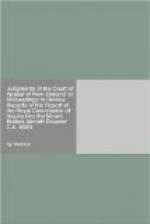Was the statutory power one of decision? The 1977 Amendment Act brought statutory investigations or inquiries into rights or liabilities within the definition of “statutory power”. An inquiry into whether any person caused or contributed to the crash by an act or omission in respect of his duties is an inquiry into liabilities. But that is less important for present purposes than the fact that the Amendment Act also extended the concept of statutory powers of decision to those “affecting” the rights of any person. The purpose was manifestly to make the ambit of review under the Act at least as wide as at common law. This point is dealt with in Daemar v. Gilliand (1981) 1 N.Z.L.R. 61.
We think it would be very difficult to justify an argument that findings likely to affect individuals in their personal civil rights or to expose them to prosecution under the criminal law are decision “affecting” their rights within the meaning of the Act. In the present case, for example, it was virtually certain that the findings of the Erebus Commission would be published by the Government. The effect on the reputation of persons found guilty of the misconduct described in the Report was likely to be devastating, at common law every citizen has a right not to be defamed without justification. Severe criticism by a public officer made after a public inquiry and inevitably accompanied by the widest publicity affects that right especially when the officer has judicial status and none the less because he has judicial immunity.
The present case is in many ways unique and, if the findings in paragraph 377 were made without jurisdiction or contrary to natural justice, it affords a striking instance of how contrary to the public interest it would be if the Courts were not prepared to protect the right to reputation. The magnitude of the disaster, bringing tragedy to many homes in New Zealand and overseas, and the fact that the national airline was involved meant that the national attention was focused on the inquiry. There are imputations of collective bad faith which had started from a high place in the company and all this was likely to receive the widest publicity, further, the findings in paragraph 377 amounted to public and official disclosures of alleged criminal conduct and led to investigation by the police to determine whether charges should be laid. In the event it was announced shortly before the hearing of the present case that there would be no such charges, but clearly the individuals concerned were in fact exposed to the hazard of prosecution as a natural consequence of the Report.
In interpreting the 1977 legislation we think that a narrow conception of rights and of what affects rights would not be in accord with the general purposes of the Act. A broad, realistic and somewhat flexible approach would enable the Act to work most effectively as an aid to achieving justice in the modern community.




